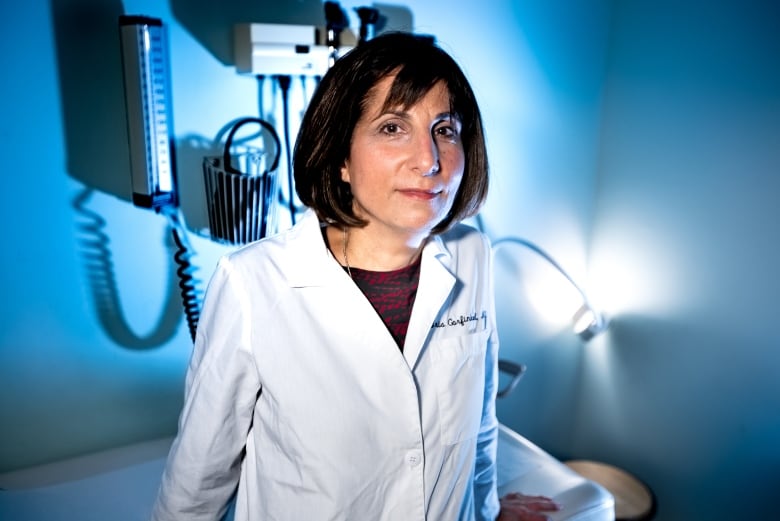Hormone therapy should be offered to more women with severe menopause: review
Research shows some women suffering needlessly from menopause

More women suffering from "debilitating" symptoms of menopause should be presented with the option of hormone therapy, according to a paper published in the Canadian Medical Association Journal (CMAJ) on Monday.
"There's a whole constellation of menopausal and perimenopausal symptoms, some of which can be extremely debilitating, especially to what is relatively a young woman in our day and age," said Dr. Iliana Lega, an endocrinologist at Women's College Hospital in Toronto and the paper's lead author.
"Every day we see how few women are asked about menopausal symptoms (and) are informed about the treatment options and we just feel there's an ongoing need to improve education on this topic," she said.
Women in their 40s and 50s are raising children and could be at the peak of their careers while trying to live with distressing symptoms, she said.
"Having disrupted sleep, having frequent hot flashes, having irritability and mood issues has a huge impact on their day-to-day," Lega said.
Menopausal hormone therapy, also known as hormone replacement therapy, has been a controversial issue since the 1990s, when a major study found an association with higher rates of breast cancer and stroke.
But many experts now say that study overstated the risks, which were mainly associated with women over 60 — when the risks for those conditions would go up anyway due to age.
Risks for hormone therapy lower for younger women
Lega and her co-authors reviewed more recent studies and found the risks are much lower for women in their 40s and 50s, especially if they use hormone therapy for five years or less.
For women between 50 and 59 years of age or who start hormone therapy within 10 years of their last period, "the additional risk of breast cancer is estimated at three additional cases for every 1,000 women who use combined menopausal hormone therapy for five years," their review said.
"Combined" menopausal hormone therapy is a mix of estrogen and progestin.
The review also found that the risk of stroke for people under 60 using hormone therapy was very small.
"Certainly in women over the age of 60, the discussion is very different," Lega said. "Usually that is not an age group (where) hormone therapy initiation is recommended."
The review paper is not intended to suggest that all women should go on menopausal hormone therapy, but to give health-care providers the information they need to discuss the options with patients and weigh the risks and benefits on an individual basis, she said.

Dr. Iris Gorfinkel, a family physician in Toronto who was not involved with the paper, agrees.
"You place what the suffering is now on one side of the scale and on the other side of the scale has to go the potential for harm," she said.
To assess potential harm, Gorfinkel talks to patients about the possible presence of a BRCA gene mutation, which is associated with a higher risk for breast cancer, along with family history.
She does the same to assess the risk of heart disease or stroke, discussing family history and other factors such as smoking, diabetes and high blood pressure.
On the other side of the scale, it's important not to underestimate the degree of suffering the patient is experiencing from menopausal symptoms, Gorfinkel said.
"The patient may be aware that this could be 'change of life,' but a lot of patients are not aware that the perimenopausal years can last a decade," she said.
"I think medicine has long told women to 'shut up and put up,'" Gorfinkel said. "The symptoms get worse and worse and worse and a lot of women just keep saying to themselves, 'I should be used to this, I should be fine.'"
Menopausal hormone therapy is up to 90 per cent effective in treating hot flashes and improves sleep quality and mood disturbances, the review paper said.
It also helps prevent the loss of bone density.
That's a significant benefit, Gorfinkel said, "because life changes on the dime when women or men fall and fracture a hip."
Hormone therapy is taken in pill or patch form to manage those symptoms, she said.
But if someone only wants to treat a localized symptom, such as dry vagina, the hormone therapy can be taken through a topical lotion, which eliminates any increased risk of breast cancer, Gorfinkel said.
The Canadian Cancer Society urges caution when considering menopausal hormone therapy.
"The Canadian Cancer Society recommends that women avoid taking HRT (hormone replacement therapy) for any reason other than to relieve severe menopausal symptoms that have not responded to other treatment," a statement on its website says.
"If you and your doctor decide that taking HRT is right for you, the lowest effective dose should be used for the shortest period of time possible."
Dr. Melinda Wu, a general practitioner in oncology at Women's College Hospital's Breast Centre, said the cancer society's position aligns with the review paper's findings that not every woman should be on hormone replacement therapy, but they should be aware that it's an option to discuss with their doctors.
"It always comes down to a risk-benefit discussion," said Wu, who was not involved in the review paper.
"I do think the 'less is more' approach to medicine in general can be appreciated by many," she said.
"We are treating something with (the) intention that we understand what benefits we're looking to achieve, and that we're using the lowest effective possible dosing of menopausal hormone therapy to achieve that benefit."
Canadian Press health coverage receives support through a partnership with the Canadian Medical Association. CP is solely responsible for this content.




